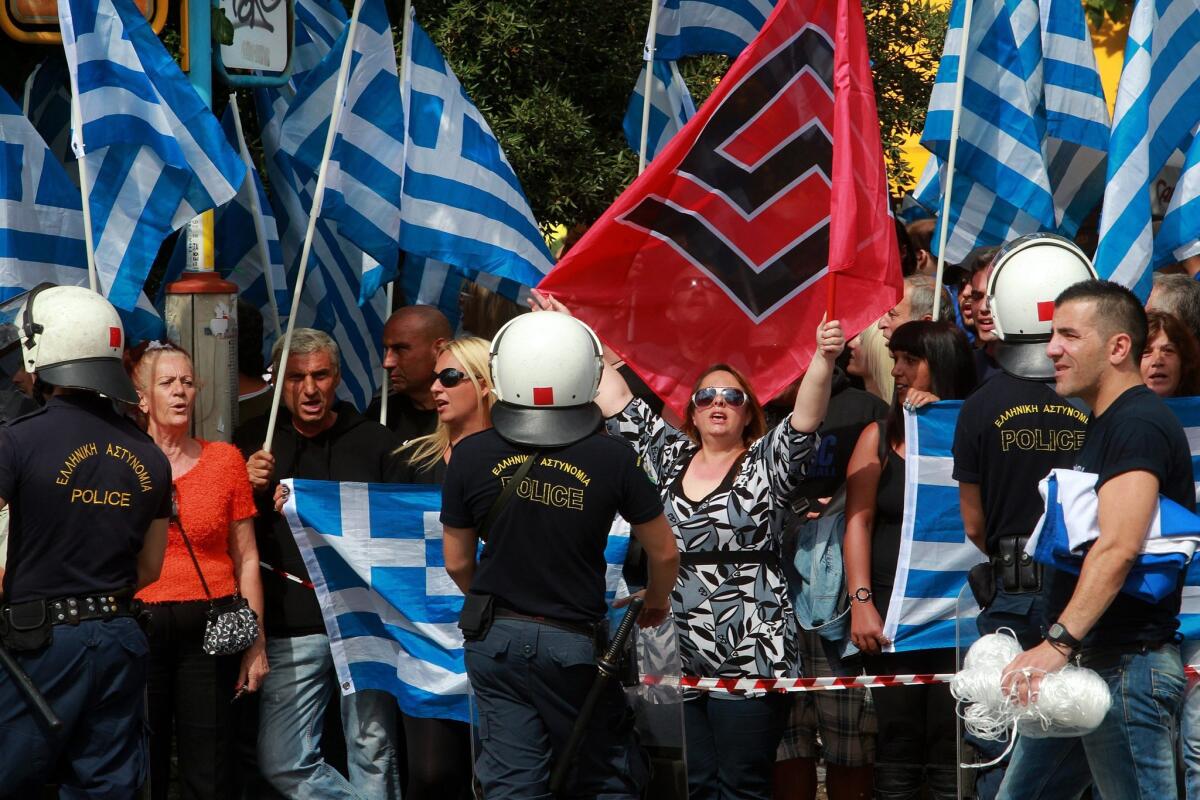Slaying of Greek rapper spurs crackdown on neo-fascist Golden Dawn

A crackdown on Greece’s neo-fascist Golden Dawn party, including the arrest of six lawmakers, has set off a frenzied debate about whether Athens authorities are persecuting political opponents.
Condemnation of the racist and nationalist ideology of the party has emanated from human rights advocates for years. Golden Dawn thugs on motorcycles are notorious for sweeping through immigrant neighborhoods to beat dark-skinned people with clubs and smash their market stalls.
But it took the slaying of a white Greek rap musician to spur the government to investigate the group and charge its leaders with belonging to a criminal organization.
Amid the economic turmoil and hardship that has gripped Greece for six years, Golden Dawn rose to become the third-strongest political faction in the country, garnering 18 seats in the 300-member legislature last year.
In a Wednesday profile of the party, the BBC reported that Golden Dawn’s popularity had reached a peak at the time of rapper Pavlos Fyssas’ Sept. 17 killing.
Fyssas, a left-wing hip-hop musician and activist, was stabbed to death after leaving a bar outside of Athens. The man arrested in the case confessed to being a Golden Dawn activist, the BBC reported.
Some media and social analysts question whether the government of Prime Minister Antonis Samaras has acted to shackle political opponents whose power and influence have been mounting in the midst of widespread unemployment and deeply cut social services.
“The prosecution of opposition parties almost invariably represents an abuse of power for political ends, damaging the rule of law, free speech and the right of voters to representation,” the ekathimerini news website commented Wednesday, noting that more than 400,000 people voted for Golden Dawn in the 2012 elections.
But Golden Dawn had lately become more brazen in its harassment of immigrants and leftists, the news site reported, citing Human Rights Watch’s long-running accusations of party-orchestrated hate crimes.
The report last week of a preliminary investigation into police collaboration with the neo-fascists spurred angry street demonstrations in Athens, demanding action to stem the rising tide of violence. Six lawmakers were among 22 Golden Dawn activists arrested last week.
Three of the parliamentarians were freed on bail Wednesday after appearing before an Athens court. But Golden Dawn leader Nikos Michaloliakos, who last week threatened to “open the gates of hell” if his party continues to be targeted, remained behind bars pending trial on charges of belonging to a criminal group, with counts including murder, assault and money-laundering.
Even as some critics questions the government’s motivations in pursuing Golden Dawn members, officials deny accusations from others in the public and from human rights groups that they dragged their feet in investigating and prosecuting Golden Dawn members committing violent acts. According to the BBC, Nikos Dendias, the minister for public safety, said the Fyssas slaying was the first crime in which authorities could draw a clear chain of command from the party’s leadership.
In a commentary published Wednesday, Al Jazeera correspondent Barnaby Phillips pondered whether the crackdown, albeit belated, has stripped Golden Dawn of its ideological instigators and eroded its grass-roots support.
“Golden Dawn’s leaders are likely to be mired in legal difficulties for some time to come. Without them, the rank-and-file are hopelessly lost,” Phillips wrote.
Indeed, in the few days since the lawmakers and party leaders were arrested, polls show support for Golden Dawn in polls has fallen as low as 6% from its 15% pinnacle two weeks ago.
That may be a fleeting development, though, as the party’s constituency of poor, disgruntled Greeks remain resentful of the European Union’s imposition of brutal austerity measures and Greece’s two main political parties -- Samaras’ New Democracy and the Socialists of PASOK -- for their failure to provide much of a safety net.
“In the grimmest neighborhoods of Athens and Pireaus, thousands of Greeks have been fed and clothed by Golden Dawn throughout this economic crisis,” Al Jazeera noted. “These people feel that the party has looked after them better than successive Greek governments.”
Golden Dawn’s pronouncements that the Greek political establishment is corrupt and that powerful European countries are indifferent to Greeks’ suffering “speak the truth,” Phillips stated.
“Much of what Golden Dawn says is nonsense,” concluded Phillips, who has covered the Greek economic crisis for Al Jazeera since 2006. “But even demagogues (and yes, it is a Greek word) speak truth from time to time.”
ALSO:
Russia charges 14 Greenpeace activists with piracy
Myanmar villages burned in deadly religious violence
Economists dial down projections for Mexico’s growth
Twitter/@cjwilliamslat
More to Read
Sign up for Essential California
The most important California stories and recommendations in your inbox every morning.
You may occasionally receive promotional content from the Los Angeles Times.











